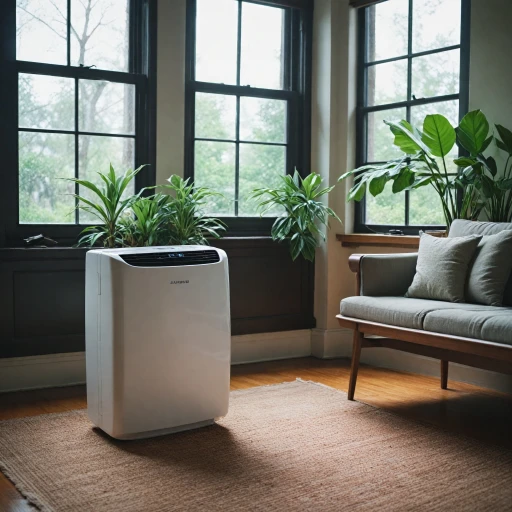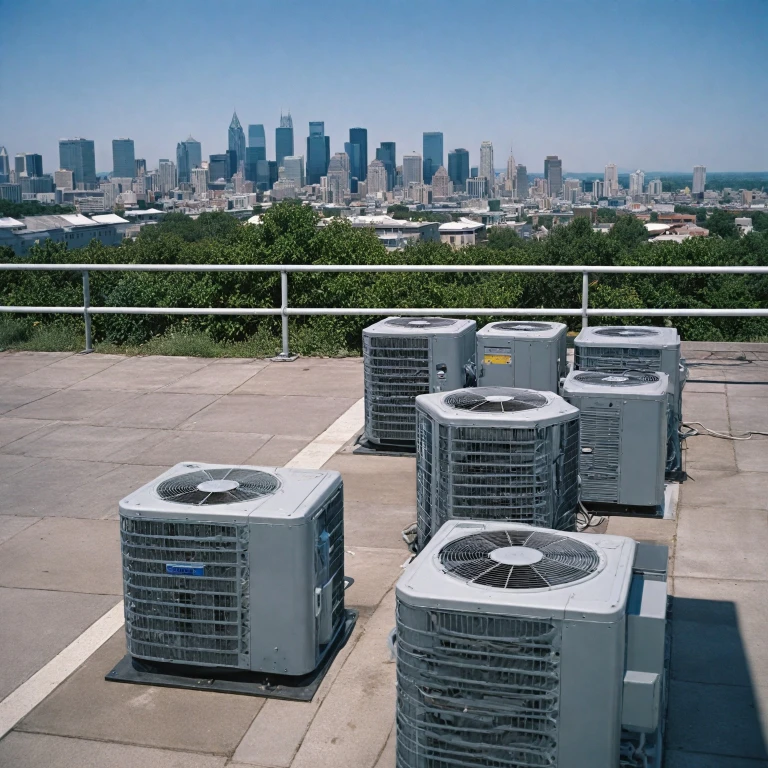Understanding Roof-Mounted Air Conditioners
Overview of Roof-Mounted Cooling Systems
Roof-mounted air conditioners, often referred to as rooftop units, are a popular choice for both residential and commercial properties, especially for those who prioritize hidden installations and space efficiency. These systems are installed on the roof of a building, providing a low profile solution that doesn't intrude upon the interior space. Key players in this market include brands like Dometic which offers products such as the Dometic Penguin that are designed to keep cool even in the most demanding conditions.
Key Features and Functionalities
Rooftop air conditioning units come with various features and functionalities that cater to different needs:
- Ducted Air Distribution: Many roof air conditioners offer a ducted air distribution system that promotes even cooling throughout the entire space.
- Inverter Compressor Technology: This feature ensures efficient energy use, often leading to reduced energy bills due to optimized heat pump operations.
- Remote Control: Many units come with remote control capabilities, providing users with convenient access to settings and adjustments.
- Heat Pump Options: Some rooftop units have heating cooling systems, providing year-round comfort by functioning as a heat pump during colder months.
Advantages of Roof-Mounted Systems
Installing a roof-mounted air conditioning unit can offer significant benefits including improved energy efficiency and the potential for a better aesthetic appeal as the unit remains out of sight. Moreover, such systems are designed to handle both solar heat and weather elements, which contributes to their longevity and reliability. When comparing these units to portable air conditioners, there are often larger output capacities suitable for cooling bigger spaces efficiently.
If you are considering an air conditioning solution for a mobile setting, such as a truck, this detailed
guide provides insights into selecting the right air conditioner for your needs.
Comparing Roof-Mounted and Portable Air Conditioners
Comparing the Convenience and Flexibility of Portable and Roof-Mounted Systems
When considering an air conditioning solution, it's essential to evaluate the differences between roof-mounted air conditioners and portable units. Each option offers distinct advantages and fits varying needs.
- Flexibility and Mobility: Portable air conditioners shine in their ability to be moved from room to room, providing targeted cooling where it's needed most. In contrast, rooftop units are stationary and serve larger, centralized areas.
- Installation: A standout feature of portable systems is their ease of installation. Typically, these units require minimal setup and can be operational quickly. Roof-mounted systems, on the other hand, demand professional installation and may involve more complex structural modifications.
- Space and Profile: Space considerations are another differentiator. Low-profile rooftop air conditioners are less intrusive but require space on the rooftop and may affect a building's aesthetic. Portable units occupy floor space but offer versatility in placement.
- Cost and Energy Efficiency: While the initial cost and energy efficiency can vary greatly, portable air conditioning systems are often more affordable with less upfront investment compared to the potentially higher msrp of rooftop units. However, for larger spaces, rooftop solutions may offer better long-term energy savings because of their comprehensive air distribution capabilities.
- Features: Both systems may offer modern features like remote controls, inverter compressor technology, and heat pump options. However, choosing a unit that includes a heat pump could provide additional benefits such as heating during colder periods.
Ultimately, the choice between portable and roof-mounted air conditioners may depend on individual needs and circumstances such as the space to be cooled, energy considerations, and budgetary constraints. For a more extensive evaluation, you may find it beneficial
to read about choosing the right air conditioner options for your specific setting.
Installation Challenges and Considerations
Key Factors in Roof-Mounted System Installation
Installing rooftop air conditioning units presents unique challenges and requires thoughtful consideration. Unlike portable units, rooftop systems are permanent and involve significant planning to ensure effective performance and structural integrity. Here are some crucial aspects to keep in mind:
- Structural Support: Before proceeding with the installation of a roof air conditioner, confirm the roof's capacity to support the additional weight. Rooftop units such as the Dometic Penguin can be quite heavy, and ensuring your roof is structurally sound is vital.
- Ducted vs. Non-Ducted Systems: The choice between ducted and non-ducted systems significantly affects installation complexity. Ducted systems require a network of air distribution channels, whereas non-ducted conditioners might be simpler but possibly less efficient in variable climate conditions.
- Profile Rooftop Units: Low profile units are often preferred to minimize wind resistance and maintain aerodynamic efficiency. This is particularly beneficial in moving vehicles, such as RVs or trucks. Find local installation experts who specialize in the type of low profile rooftop unit you're considering.
- Rooftop Systems Compatibility: Ensure that chosen equipment is compatible with your existing electrical systems and can handle the desired conditioning capacity. This involves selecting the right power options and assessing whether a heat pump or an inverter compressor might be necessary for optimal energy efficiency.
- Remote Control and Automation: Modern systems often come with remote control functionalities, allowing for convenient adjustments to heating cooling profiles. Decide if you need sophisticated controls or if a standard universal air conditioning control panel suffices.
These installation challenges should not deter you from considering rooftop units if they align with your cooling needs and long-term energy efficiency goals. Always consult with professionals to ensure a seamless and safe installation process. For those specifically looking for portable solutions, it might be beneficial to
find the best portable air conditioner service center in Victoria BC for expert guidance and service options.
Energy Efficiency and Cost Implications
Evaluating the Effectiveness and Costs
Energy efficiency is a crucial factor to consider when choosing an air conditioning solution. Both rooftop air conditioners and portable units have distinct energy requirements and efficiencies. Rooftop units often come with features like inverter compressors that improve efficiency by adjusting the speed of the cooling system based on the current need. Dometic rooftop units, for example, are known for their energy-efficient low profile designs that complement a variety of environments.
While rooftop air conditioners generally provide powerful cooling capabilities, some portable air conditioners are designed with energy-saving features such as programmable timers and remote controls. These features can help users better manage energy consumption, but the overall efficiency might still be lower compared to ducted rooftop systems.
If heat pumps are a consideration, rooftop systems with integrated heating and cooling provide a dual function that may be an attractive option in regions experiencing both extreme heat and cold. Utilizing a heat pump in these systems can reduce reliance on separate heating units, potentially lowering energy costs over time.
When assessing the financial implications, it’s important to weigh upfront costs against long-term savings. Rooftop air conditioners may carry a higher MSRP due to installation and equipment costs, yet their operational efficiency can lead to lower energy bills in the long run. Portable units, while often cheaper to purchase initially, might result in higher electricity expenses unless regularly optimized for energy conservation.
Ultimately, the choice between a rooftop air conditioning system and a portable unit will involve a balance between immediate budget constraints and ongoing cost efficiency. Evaluating energy ratings, cooling requirements, and personal preferences will help in finding an ideal solution to keep cool year-round.
Maintenance and Longevity
Maintenance Tips for Longevity and Optimal Performance
Maintaining your rooftop air conditioner properly ensures the unit runs smoothly and extends its lifespan. Regular maintenance is vital for post-installation care. Whether you have a dometic or ducted unit, these suggestions can help maximize efficiency and longevity.
- Check the Air Filters: Regularly cleaning or replacing air filters ensures effective air distribution and prevents the system from overworking, which can lead to premature wear. A clogged filter can reduce cooling efficiency significantly.
- Inspect Components: Examine the unit's components, including the inverter compressor and heat pump systems, particularly if your roof air conditioner features low profile or high profile rooftop units. Pay attention to any unusual sounds or vibrations that can indicate potential issues.
- Clean the Coils: The evaporator and condenser coils of your rooftop systems should be kept clean to facilitate optimal heat exchange. Dirt and debris accumulation can lead to poor performance and higher energy consumption.
- Check Drainage: Ensure that the rooftop unit’s drainage system is functioning correctly to prevent water accumulation, which can lead to rust or damage the unit’s profile.
- Monitor Remote Controls and Thermostat: Verify that the remote control settings and thermostat are functioning as intended, enabling efficient heating and cooling. It might be beneficial to find a universal air remote if you encounter compatibility issues.
Overall, conducting regular maintenance checks helps in spotting early signs of wear and tear, allowing for prompt repairs and sustaining performance. Ensure to consult the manufacturer’s guidelines or find local professionals for servicing your specific model, whether it’s the dometic penguin or other variants. Maintaining these components diligently can help you keep cool efficiently while managing long-term msrp costs and ensuring your roof air conditioner serves you well for years to come.
Choosing the Right Air Conditioning Solution for Your Needs
Factors to Evaluate for Your Air Conditioning Solution
Choosing the right air conditioning solution requires careful consideration of various factors to meet your specific needs and ensure optimal performance. Whether you're considering a rooftop unit or a portable air conditioner, here are key elements to consider when making your decision:
- Cooling Requirements: Understanding your space's cooling needs is vital. Rooftop air conditioners, such as the Dometic Penguin, offer robust cooling for larger areas and are well-suited for certain architectural structures. Portable air conditioners provide flexibility and are ideal for smaller spaces or when you need to move the unit between rooms.
- Installation and Maintenance: Rooftop units might require professional installation and special consideration for your roof and ducted systems. In contrast, portable units are typically easier to set up and maintain. Consider the complexities involved with each type regarding your budget and long-term convenience.
- Energy Efficiency: Both rooftop systems and portable air conditioner units come with varying levels of energy efficiency. Profile rooftop systems might have an edge in general energy efficiency due to advanced features like inverter compressors. Evaluate the energy ratings and choose an option that satisfies both your environmental concerns and cost-saving goals.
- Functionality and Features: Consider what additional features are important for your comfort and convenience. Rooftop units often offer integrated heat pump capabilities and advanced controls such as remote control systems. Portable units may include different air distribution settings and programmable timers.
- Price and Value (MSRP): Examine the MSRP and overall value of the air conditioners you're considering. Balance the upfront costs with long-term savings from energy-efficient models and low-maintenance units when planning your budget.
Ultimately, whether opting for a low-profile rooftop air conditioner or a versatile universal air conditioner, ensure your choice aligns with your specific requirements, offering optimal cooling and heating efficiency for your home or vehicle. To better understand seasonal considerations, explore this
seasonal air conditioner selection guide for useful insights.

